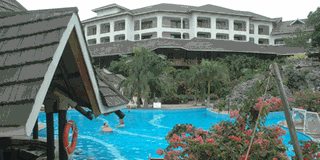Breaking News: At least 10 feared to have drowned in Makueni river
Hoteliers insist closure a normal phenomenon

A beach hotel in Mombasa: ''Lay offs and closures are normal during the low season, hotels use these periods for renovation.''
A sombre mood has engulfed the North Coast tourist hub of Malindi as the tourist low season sets in with the laying off of about 4,000 hotel workers and the slowing down of the local economy.
Hoteliers who have described the low season as an “unfortunate but normal annual occurrence” are calling for the diversification of market targets for the country’s tourism sector.
Italian consular in Malindi Mr Roberto Macri says the North Coast has sadly relied almost solely on the Italian market and called on players to diversify marketing to tap Russian, French, American, Swedish, Spanish, British and other markets.
Hoteliers in the Coast region have however denied claims in a section of the press that the political stalemate has affected the tourism industry.
Tthe Kenya Association of Hotelkeepers and Caterers (KAHC) Coast branch chairman Mohamed Hersi said the drop in foreign tourist arrivals in the hotels was as a result of the customary annual low tourist season and not the political wars between ODM and PNU leaders.
Speaking to the Nation on Monday, Mr Hersi said the report which was featured by one of the local TV stations was misleading, arguing that 85 per cent of hotels in Malindi and Watamu closed down owing to the low tourist season.
"A report which was aired by a local TV station on Monday which indicated that some hotels in the region have closed down due to the political wrangles between ODM and PNU was misleading," Mr Hersi said.
He added: "The truth of the matter is that currently hotels have low number of guests because of the annual low tourist season. Such misleading reports must be avoided as they can give the country a bad image abroad."
Mr Hersi who is also the Sarova Whitesands Beach Resort general manager said hotels in the North Coast have an average bed occupancy of between 50 per cent and 60 per cent.
He added that hotels currently depend on conferences, seminars and workshops to keep afloat. The hotelier said the industry is expected to pick up as from June 30 and July.
Serena Beach Hotel general manager Charles Muya also attributed the low number of guests to the low tourist season.
Mr Muya said during low tourist season hotels record low bed occupancies owing to a drop of charter flights from Europe.
Baobab Beach Resort director Bimal Thaker concurred with his colleagues that the slump in tourism industry was as a result of the low tourist season.
Branch chairman, Kenya Hotel Keepers and Caterers Association Mr Isaac Rodrott said out of the 25 beach hotels in the Malindi area, only two would remain open throughout the April-July low season.
Mr Rodrott said the low season was a normal occurrence. Hotels use this time to make renovations and refurbishments to their premises, he said.
However, the last season did not have enough tourists leading to a cash crunch to many of the establishments, he said.
“This low season might not have many renovations because hotels have no money,” he said and blamed the media and politicians for making adverse statements about the country that led to fewer bookings. He asked them to “tone down”.
Mr Rodrott said hotels do not sack their workers during this season as it is widely believed but send them on leave.
“We would like to ask banks not to withhold funds to hotels as is the norm during this season. Banks should not freeze loans to us because we are in normal operation. Tourism low seasons are normal all over the world,” he said.
The Marketing manager of Eden Roc Hotel which mainly deals with German clientele Mr Issa Rajab Mbugua said the low season greatly slows down the economy of the North Coast as it comes with massive workers’ layoffs.
Mr Mbugua said his hotel which has never closed for low season since 1953 has known how to survive during such times.
“We have diversified our market to European countries including Estonia and strengthened our domestic market targets. As a result we hold local seminars and workshops. As a result we are able to keep our employees throughout as we remain open”, he said.
He said the response from domestic tourists was good. The tourism sector, however, faced inadequate funding for marketing abroad.
“Although marketing of Kenya abroad is good, the sector lacks adequate funding,” he said, adding that political instability and violence could ruin the sector for a long time.
Mr Macri urged the ministry of tourism to look into air fares which he described as “too high”. Charter flights should be encouraged with attractive air fares, he said.
Mr Macri said the last season, surprisingly, did not have as many guests as last year which was seriously affected by the post-election violence.
The 25 hotels with a bed capacity of 3,500 had 20 to 30 per cent less tourists compared to last year, he said.
Mr Macri urged the ministry to bring programmes to contain beach boys and operators who should treat tourists in a friendlier manner, adding, “Sometimes tourists are not treated too kindly or too friendly”.
He lamented that many tourists are increasingly feeling cheated when they go on safari because they often do not see “the big five” as promised in their safari packages.
“These days, tourists complain a lot to me that when they go on safari; they only see a lot of elephants and buffalo, not lions or cheetahs or rhino,” he said adding that something should be done before tourists lose confidence in the tour operators.
Ends.




